Hamish McLachlan: Denis Pagan reveals the mistake AFL coaches make
Denis Pagan figured out early in his career what it takes to make a great AFL coach. And says present day coaches are stuffing it up.
News
Don't miss out on the headlines from News. Followed categories will be added to My News.
Denis Pagan had an uncanny knack of getting teams to win football matches.
Two Premierships in the AFL as coach, and finals almost as a matter of course. Then he turned his attention to horse racing, having had no experience at all.
With just his second winner, Denis won the Victorian Derby with a maiden called Johnny Get Angry. If you wrote the script and sent it to Hollywood, they’d send it back saying it was too far fetched.
HM: Denis does parenting help coaching, and coaching help racehorse training, or are all three unrelated?
DP: Ahhhh … well, most kids and some players don’t seem to take any notice of you, I’ve found Hame! But I think you can train your horses to get better and better as they go along. All three are very technical assignments, and they’re all different in their own unique way.
HM: When did you feel like you were going to be a good coach — and then a good racehorse trainer?
DP: I’ve never thought about being good as such, I just started doing both. When I finished as a player, I still just wanted to be involved in the game. The only way to be involved, was as a coach. I didn’t have an illustrious career — I was pretty ordinary as a player.
HM: So was coaching a long shot then?
DP: I remember as a young man applying for the role of playing coach for the Fitzroy Reserves … I never even got a reply to my submission! I went into the VFA as a captain coach at Yarraville, and out of the blue Ron Joseph from North Melbourne rang me to become involved with their U/19’s. This was in the early 80s. It all just took off from there. I became totally obsessed with coaching footballers, and I was lucky enough to get some good results at U/19 level which paved the way for me.
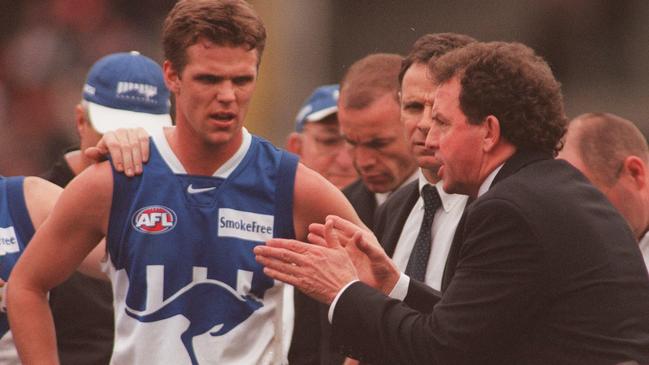
HM: Out of all those who were available in the phone book, why did Ron Joseph call you for the North job?
DP: That’s a good question — I honestly haven’t got the faintest idea. Perhaps he had this theory that broken down back pocket players without ability would make the best coaches!
HM: Speaking of back pockets who became coaches, did your wife take a call from a back-pocket player when you were at North looking after the U/19’s?
DP: That is true — Kevin Sheedy. I was sound asleep in bed, and my wife came in, tapped me on the shoulder and said, “Kevin Sheedy is on the phone. He wants to talk to you”. I said, “It couldn’t be!”. I thought someone was having a lend of me, because you get a lot of people making silly phone calls. It was Kevin. He said, “I want you to coach the Essendon reserves and be my assistant”. A couple of days later I was in front of the players speaking to kings of the game like Watson, Daniher and Madden — these sorts of blokes. Kevin, as Kevin does, took a punt and then empowered me.
HM: How did you find that?
DP: Kevin is the most unique character that I’ve met in footy. The one thing he does that few do, is he promotes anyone with any ambition. At Essendon, Kevin would be that busy with other things, and he’d say “Pagan, you take training tonight”. The first day for me at Essendon was the day that all the players got delisted. David Wheadon was an assistant, and Danny Corcoran was the new football manager. We were up in the restaurant in the Essendon grandstand, and all the players were sitting there, apprehensive and anxious. I felt uncomfortable because all the players are sitting down on chairs, sizing us up, whispering and murmuring. Kevin walks in — he’s always on Vince Lombardi time, and he says to me, “Pagan, say something to the players”. You have to think pretty quickly on your feet with Kevin.
HM: What did you say?
DP: I spoke about people who have wasted their opportunities. I implored them to make the most of what was in front of them and not to let it pass them by without a real good fight.
HM: You must have had something, as you had a habit of making Grand Finals – you took the Bombers reserves to the premiership in 92’?
DP: I was lucky to be surrounded by good people and players who understood the importance of playing their roles. At North Melbourne, the Under 19s were in nine grand finals in a row, and we won five.
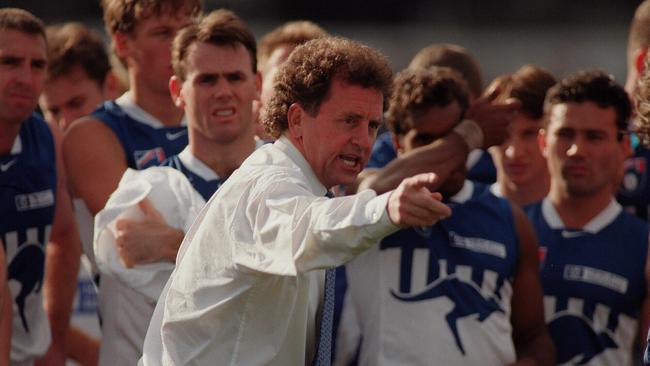
HM: What are your learnings from coaching?
DP: I’m obsessive with what I do, and I realised very early in the piece it wasn’t a popularity contest. So many coaches make the mistake of wanting to be popular, but for me, it was all about respect. I believed that you didn’t need to be liked, you wanted to be respected. I figured out early in the piece that if you’re going to be successful, you need to get people to do things they don’t want to do sometimes. You’ve got to be meticulous in your approach. I had a compulsive obsessive attitude, and I wanted to make sure I did everything right. I still believe today, whether it’s in football or horse racing, the key to success is to do the basics well, over and over again. That’s been a philosophy of mine, and it works so much better when you’ve got a bit of talent!
HM: In ’93, when Adelaide beat the Kangaroos by 147 points and Wayne Schimmelbusch was sacked. Is it true that there were three candidates approached, or at least running for the job? You, Rodney Eade, and Dermott Brereton?
DP: When they called me, there were three. In my opinion Dermott was a 5/2 favourite, Rodney Eade at 9/2, and myself at 66/1. For whatever reason, Dermott pulled out, and it was just me and Rodney. I can still remember having a chat with Ron Evans, the former chairman of the AFL. He was a very successful businessman, a champion full forward with the Bombers, and a very good opening batsman with North Melbourne in the District Cricket Association. We were sitting down one night after a game, and we were talking about negotiations. I said, “How do you go about it, Ron?” He said, “When you walk into a room, if you’ve got to present or try and negotiate something, be civil with everyone, acknowledge everybody, and when they all are sitting down, jump up and say, “Gentleman, would you like me to open the batting?” Very rarely would people say, “No, sit down”. They’d let you go, and then you would have the conversation on your terms!
HM: Did you open the batting?
DP: I did. I remember going for the interview at Gray Street, West Brunswick, at Peter De Rauch’s lighting showroom and factory. North Melbourne had twelve directors then. I had a briefcase and some ideas so I stood up, handed my dossiers around, and they let me talk for an hour and a half.
HM: How did you think it had gone?
DP: Pretty well. I knew some people were sceptical of me because I was only an U/19’s coach. I had the interview on Wednesday afternoon, and on Saturday morning I was driving to the old Sunshine ground for Essendon to play a practice match against Footscray, and I got a phone call from Greg Miller as I was getting out of my car. “You’ve got the job at North Melbourne”. I was over the moon. I reckon I was the only coach in the history of the AFL/VFL that was employed by two clubs at the same time! I hadn’t spoken to Greg Miller about what sort of money I was going to get. They eventually said to me, “We’ll give you $90,000”. I said, “I’m getting $90,000 working and coaching at Essendon”. Greg Miller, in his very generous way said, “Alright … $100,000”.
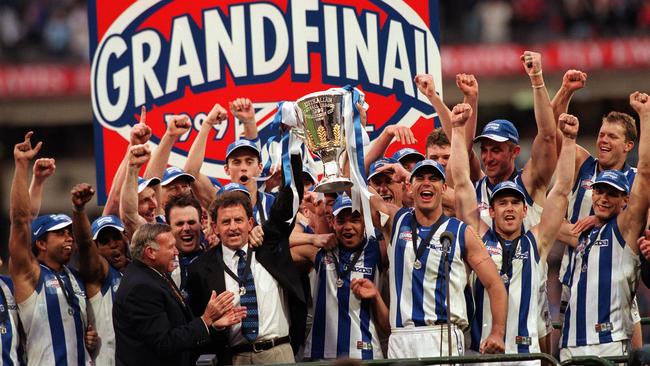
HM: And you probably weren’t even sure they could pay you at that point. When you walked in and had a look around, they weren’t in a great state, were they?
DP: They weren’t, but I didn’t care whether they could pay me or not. I had the job, and I was going to make a good fist of it. North Melbourne always found a way, there have always been stalwarts that have been a part of bigger crises and tests than that. It didn’t worry me. We had old portables, an old gym, a swimming pool next door to the ground, and when we wanted to train indoors, we’d go up to the Ascotvale Leisure Centre. The greatest asset an organisation can have is the people that work there. That was the reason North Melbourne had success. They had good people everywhere — good players, good administrators, and good staff in training. Some of the trainers were legendary at North Melbourne. It was great unity, and a great lesson in life. When you’re all on the same page, it’s about the quality of the individuals. I compare the two places that I coached at, North and Carlton. Carlton were splintered and fractured, full of Chinese whispers and groups pointing fingers. North Melbourne in the 90s just had the best foundation that you could have.
HM: Do you think coaching in 2021 would be a lot more complicated than 1993 given the generational attitudes have changed.
DP: The most important part is still to win the football, and everything else stems from that. Whatever the mindset of the players, just get them to win the football. A lot of young coaches these days want to completely change the game, instead of doing the basics well. Some of the sports science is too involved now — they’ve taken the game hostage. I don’t like the idea of coaches going on the ground after a team’s won. Some of the coaches get out and celebrate at round five like they’ve won the premiership. Just say thank you to the supporters and get off the ground as quickly as you can!
HM: Seemingly the young coaches aren’t as in vogue as they once were?
DP: No, the shift now in the AFL is that they’re going for more seasoned coaches. North Melbourne’s appointed a bloke who’s 56 years of age. That wouldn’t have happened 10 years ago — we’d have gone for a 35 years old with no experience. I figure that if you’ve had 10 experiences in success, 10 experiences in failure, 10 experiences in crises, 10 experiences where your best player’s injured, 10 experiences in calamities at your club, then when you have this next experience, you handle it better. A few years after I retired, I was in a better position with all the experience I’d had to coach a football team than ever before. Some of the people who make the decisions wouldn’t know a football coach if it jumped up in the middle of their Special K in the morning!
HM: In theory then, you’re best placed to coach when you’re sacked. I know you’re not maybe right for the club, or the view of the board is you’re not right for the club, but given all the experience you’ve had, the longer you go, the better you coach?
DP: Exactly. If people have practice doing it, and they know how to do it under pressure, in the clear light of day most people know what to do, but I can tell you once the game starts, it’s a thousand miles an hour. You have to make decisions on your feet, and you’ve got to make the right decisions.
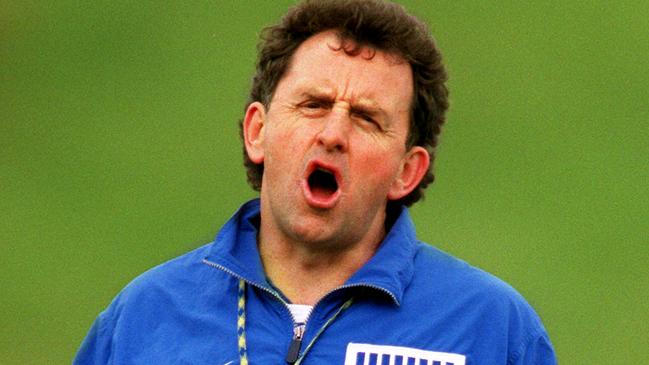
HM: It’s fascinating when you see some of the coolest heads you’ve met, and at three quarter time they’re smashing a phone to pieces in the coaches box. You can’t imagine it in the law firm, or the doctor’s surgery. It’s just a game that peaks emotions.
DP: As a player you can let your emotions out, but as a coach you’ve got to sit still, and it can be such a frustrating game.
HM: What would be the one change to the game you’d make?
DP: Leave the rules alone! The game has taken care of itself for 150 years. I’d get all the people on the rules committee a first class ticket to Hawaii, and tell them to stay there for three years.
HM: Tricky with COVID … wen did you think you might want to go racehorse training?
DP: I’d had horses with John Sadler and Troy Corstens when they were in partnership. I’d said to them that I’d love to become a horse trainer — I really loved going down to the stables. I remember going down to John Sadler’s stables, and some afternoons he’d pick out his quietest horse and we’d take them for a walk around the Flemington racecourse. I’d be chatting with him, and often I thought, “Isn’t this just magic!”
HM: Would you be riding or just leading one?
DP: I haven’t been on a horse since I was 18! I used to go to Jack Knight’s riding school in Broadford. We’d have great days up there. I look at our track riders, and they’re the most courageous sportspeople. Thoroughbreds can be very unpredictable, and you’ve got to be on your toes all the time. I saw a horse backflip on a girl and crush her pelvis just as they’re walking in the carpark about eight weeks ago. It’s a dangerous game.
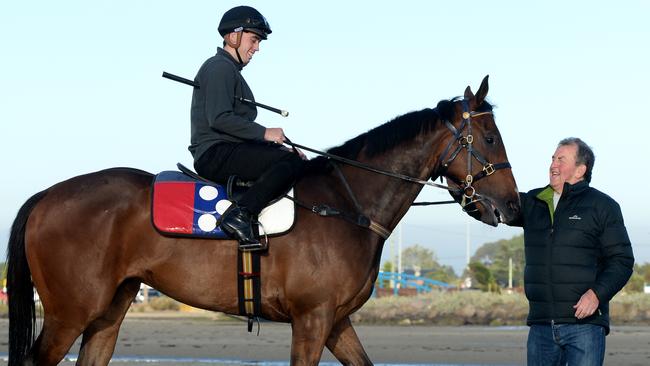
HM: The other thing is when they jump on board, they have their big toe only in the irons, they’ve got a saddle that doesn’t weigh much more than a box of tissues, and they’re going at 50 to 60 miles an hour on half a tonne.
DP: I held Lachie King’s saddle, and I reckon I could have put the saddle in my back pocket! Incredible.
HM: When did you say, actually, “I’m going to take out my trainer’s license?”
DP: I was coming back from Blue Gum Farm looking for a couple of horses with Troy. He said, “Why don’t you do what you really want to do, and train?”. I said, “That was half in jest, Troy”. He said, “I’ll make it easy for you. I’ll sublet my boxes to you, I’ll get permission from the VRC, and I’ll sublet my staff”. He did everything from that moment on to pave the way for me. I took it up, went down every morning at 4am, developed an understanding, and I was taught how to saddle up and feed and all that sort of stuff.
HM: You started not knowing much?
DP: Less than that! I applied for my license, but they wouldn’t give it to me. I had to wait fifteen months, and in July last year they gave me my license, and it’s panned out well from there.
HM: What do you actually have to do to get your license? Why was it delayed?
DP: There are assignments to do — about 25 modules. One of the rules and requirements is that you’ve got to be a stable hand for five years, or assistant trainer for three years before you can get a restricted license. I didn’t fit that criteria, and I said to them, “Look, I’m one blood test away from a disaster. I just want to have a crack at it”. They didn’t care. I applied a couple of times, and they said I’d get a pre trainers’ license. That means you can train your horses up until four weeks before they’ve got to run, then you’ve got to give them to a registered trainer. I said I’d cop that. “Come back and see us in 12 months”. That twelve months went terribly slowly – I was getting frustrated. I applied again, and they gave me a license to train my own horses, but I couldn’t train for anybody else. My wife and my daughter’s name was on the ownership of my horses, so I had to take them off before they gave me a restricted license. I’ve been trying to build my team up. I want to get a team of ten, and I’ve had that many people ask me to train horses for them, but I can’t! I’ll just concentrate on my own.
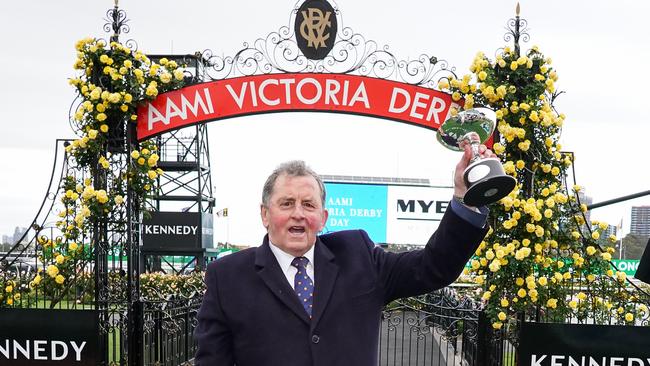
HM: I didn’t think I would see you in tears after a big win.
DP: There was no one more surprised than I was! I never thought in a million years it would have broken down. I still can’t explain it — I just couldn’t speak. When I first got my license, all I was aiming for was a runner at Flemington. I’ve had 13 runners, and nine or 10 of them have been at Flemington. I’ve only been to two country tracks + Seymour and Geelong. Everything else has been in town. Flemington, Sandown and Moonee Valley. I just wanted a runner.
HM: Did you think you could win the Derby with Johnny Get Angry?
DP: I though he had some sort of chance of running in the first five or six. At the 200m mark you could see he was going to be right in the finish, and at the 150m I could see he was going to win. It’s the strangest feeling in the world. Peter Moody tried to interview me, and I tried to speak, but words wouldn’t come out. You know … I wasn’t really crying … It was just a very bad case of hay fever. It all just overwhelmed me and I couldn’t do anything about it. I can imagine everyone at North thought, “What about this old sook Pagan!”
HM: (laughs) It is an extraordinary thing. The chances of Bill Belichick training the Kentucky Derby winner, or Sir Alex Ferguson training the Epsom Derby winner are a million to one. It would have the same price. D. Pagan.
DP: I think you’d have got bigger odds than that!
HM: One of the great pieces of the story is, as you always did as a football coach, you backed your man in. Lachie King — the apprentice — was given his chance.
DP: It worked for me with young footballers. He was terrific, Lachie. I’d take the horse to the beach, and he’d want to come down there and ride it. Imagine asking some of the top line jockeys. “I’m taking my horse down to wade through the shallows — want to come down and spend an hour down there?” It wouldn’t happen!
HM: Kids, premierships as a coach, group one trainer. You’ve had a big life.
DP: I have been very lucky. No overnight sensations are usually 30 years in the making. I still think to myself now, how did I ever train a derby winner?
HM: When you can take outside horses, please let me know.
DP: (laughs) Good on you, Hamish, I will, I appreciate that.
More Coverage
Originally published as Hamish McLachlan: Denis Pagan reveals the mistake AFL coaches make




